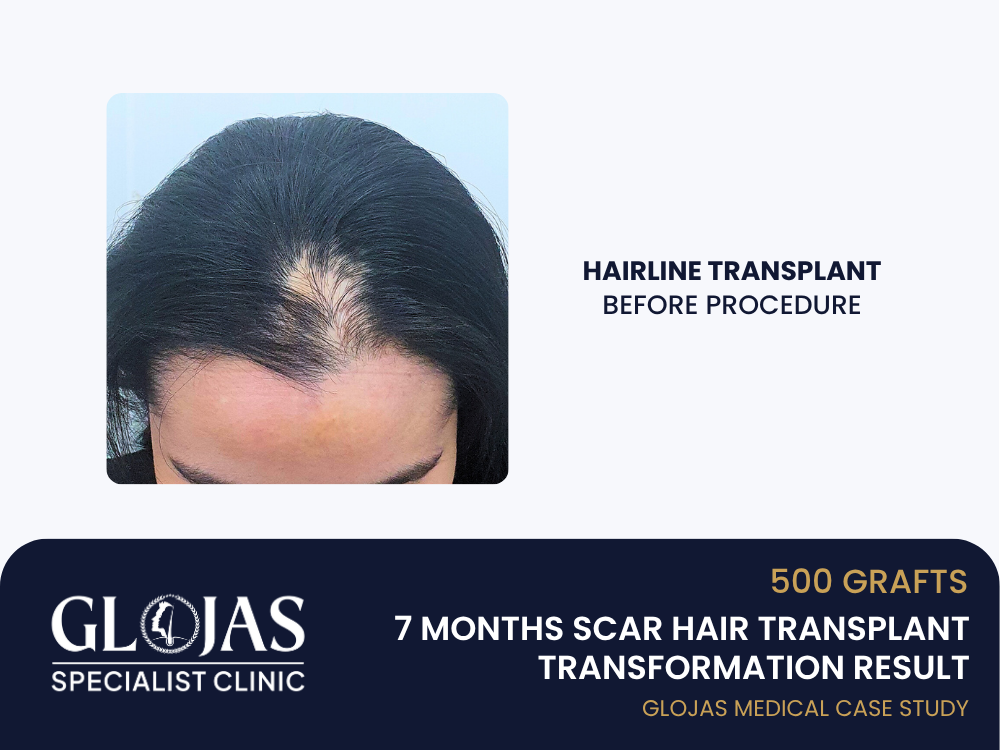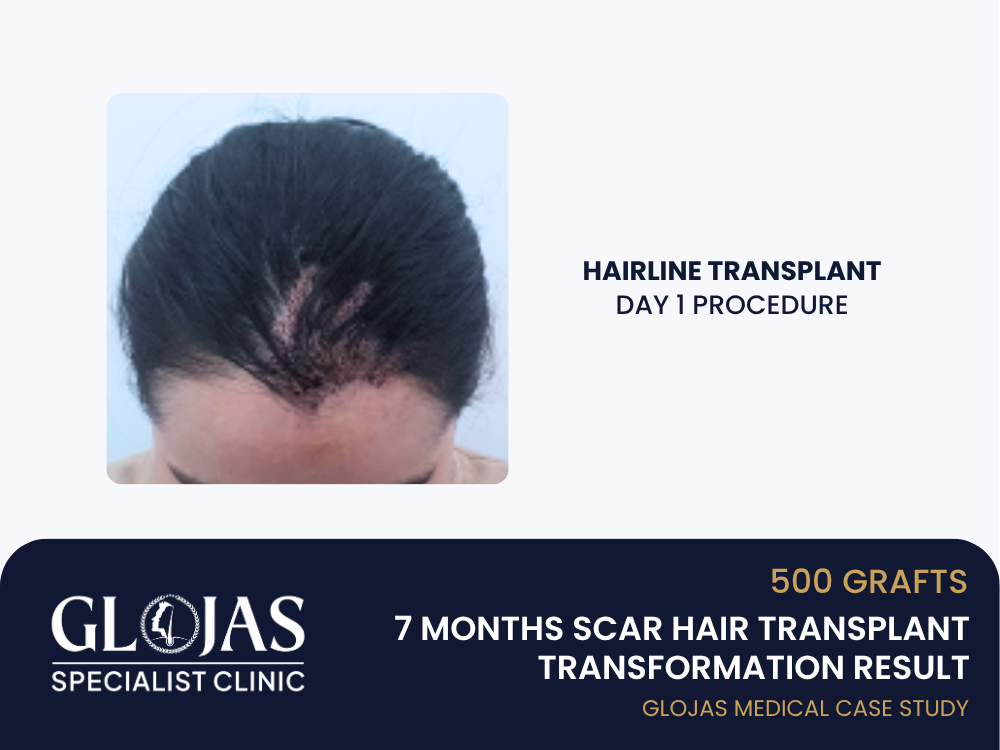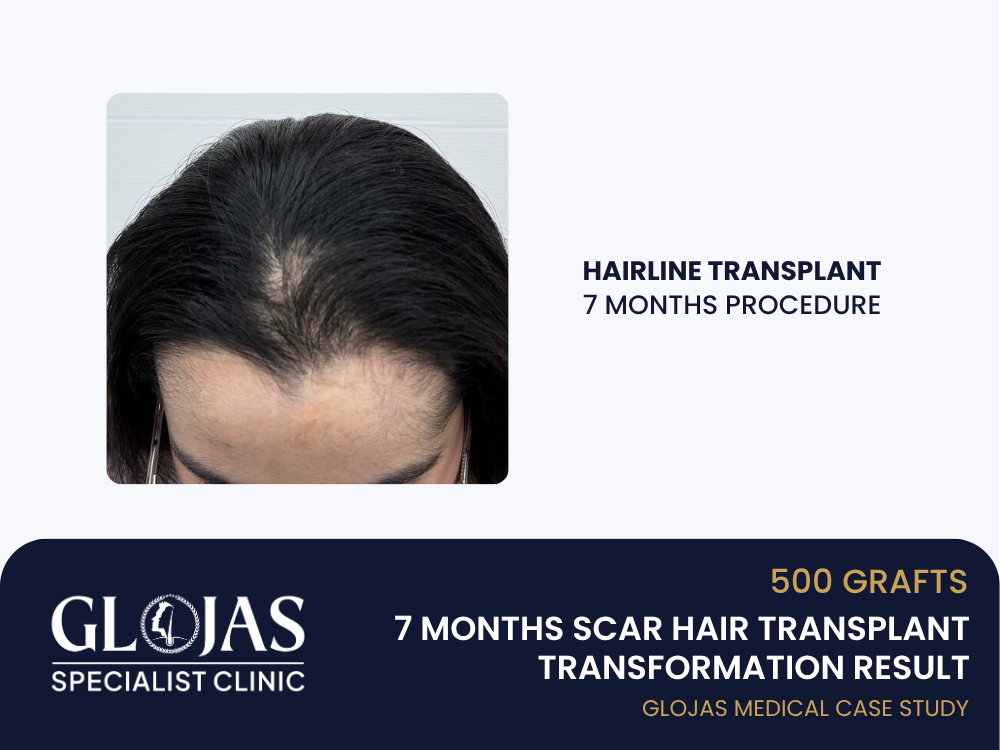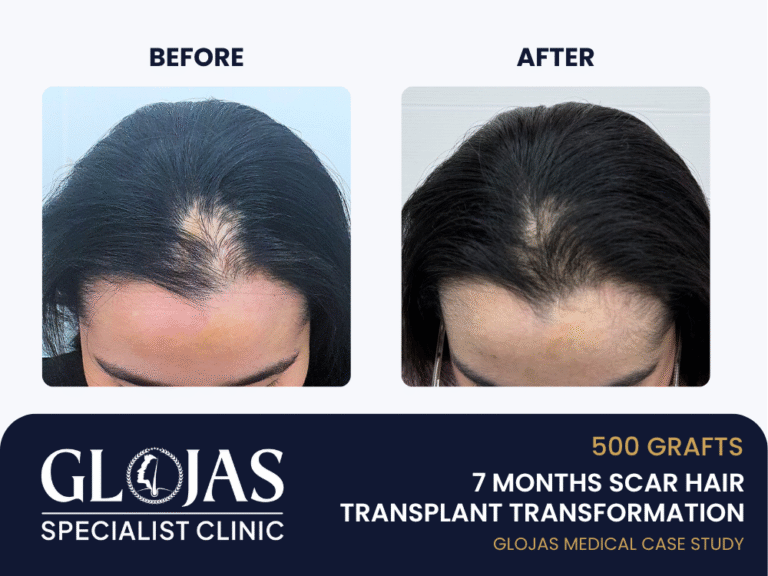Hair loss caused by scarring can be one of the most emotionally difficult conditions to treat, especially for women. While traditional baldness often comes from genetic causes, trauma like burns or surgery can leave areas of the scalp permanently bare, unable to grow hair. But advancements like scar hair transplant technology have created solutions.
This case study details how a female patient successfully restored hair growth in a burn-scarred area of her scalp using the SMART™ FUE Scar Hair Transplant method, with visible, natural-looking results in just 7 months.
Patient Profile
Age: 28
Gender: Female
Issue: Second-degree burn scar (size: approx. 4cm x 3cm) on right parietal scalp due to childhood accident
Hair Type: Fine, straight, dark brown
Scar Type: Mature, stable, non-hypertrophic
Concerns: Aesthetic impact when tying hair up, thinning look around the scar
Her main goal was to blend the scarred area with the surrounding hair, so that the patch was no longer visible in daily hairstyles.
Consultation & Assessment – Scar Hair Transplant
At the initial consultation, the scar tissue was evaluated to confirm suitability for transplant. Using scalp microscopy and physical testing, doctors confirmed:
The scar was mature and had an adequate blood supply
There was no hypertrophic or keloid formation
Surrounding hair density was high enough for blending
Plan:
Use 500 grafts to fill and camouflage the scar
Focus on natural angling and low-density blending for realism
Use the SMART™ FUE technique to minimize trauma and increase graft survival in scar tissue
Procedure Overview

Technique Used: SMART™ FUE (Scalp Micro Advanced Restoration Technique)
Grafts Placed: 500
Punch Size: 0.7 mm
Donor Site: Occipital scalp (back of head)
Anesthesia: Local
Procedure Time: Approx. 4 hours
Recovery Time: 5–7 days
Scar tissue is often more challenging than healthy scalp skin. However, the SMART™ FUE system allows for ultra-precise placement of grafts, ensuring improved oxygenation and survival rate in lower-blood-supply areas like scars.
Growth Timeline (7 Months)

| Timeline | Progress |
|---|---|
| Week 1 | Mild redness and crusting at the implant site |
| Week 4 | Temporary hair shedding (shock loss) |
| Month 3 | First visible new growth — thin and baby-fine hairs |
| Month 5 | Density increases, and the scar begins to blend into the surrounding hair |
| Month 7 | Approx. 80% full result, no visible scarring when hair is styled normally |
Before & After

| Before | After 7 Months |
|---|---|
| Smooth, shiny burn scar on parietal scalp | Camouflaged area with natural hair covering the scar |
| Visible bald spot when hair was parted or tied | Confident styling with parting or ponytail |
| Psychological discomfort in social settings | Improved self-image and restored confidence |
Patient Testimonial
“I’ve been hiding this scar for years. I never thought hair could grow there again. But after just a few months, I could part my hair like normal — the scar is almost invisible. It’s been such a boost to my confidence.”
Why Choose SMART™ FUE for Scar Repair?
Scarred scalp areas have lower blood circulation and higher risks of graft rejection. The SMART™ FUE technique utilizes finer punches and strategic angling to maximize graft survival in areas with compromised blood supply.
Advantages:
Minimal trauma to scar tissue
Higher graft survival even in fibrotic skin
No stitches or linear scarring
Short downtime and natural finish
Aftercare & Maintenance
Gentle shampoo after 48 hours
Avoid pressure on scar area (e.g., tight ponytails) for 2 weeks
No direct sun exposure for 14 days
PRP therapy at 3 months (optional, recommended for scar tissue)
Normal styling resumed by week 3
5 Frequently Asked Questions (FAQ)
1. Can hair grow on a scar?
Yes, with the right technique and scar condition. If the scar has healed fully, has sufficient blood flow, and is non-hypertrophic, an FUE transplant can achieve successful growth.
2. Will the scar completely disappear?
The scar won’t vanish, but with a successful transplant, it can become visually invisible, camouflaged by new hair growing through it.
3. How long do the results last?
The transplanted hairs are permanent and resistant to hair loss. Once they grow, they stay for life unless impacted by other trauma.
4. Is this painful?
The procedure uses local anesthesia, making it virtually painless. Most patients report only minor discomfort during recovery.
5. Is 500 grafts enough?
For a small to medium scar (under 15cm²), 500 grafts are typically sufficient to blend and conceal the area effectively, depending on scar depth and hair density goals.
Conclusion
This case highlights the effectiveness of SMART™ FUE Scar Hair Transplant for restoring hair over burn scars. Using just 500 grafts, this female patient regained her ability to confidently wear any hairstyle within 7 months, with no visible signs of the old trauma.
For women affected by scalp scarring from burns or injury, this solution offers a life-changing restoration, both physically and emotionally.
